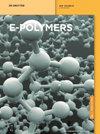ARGET ATRP of styrene with low catalyst usage in bio-based solvent γ-valerolactone
IF 3.3
3区 化学
Q2 POLYMER SCIENCE
引用次数: 0
Abstract
The application of bio-based solvents for living radical polymerization has been a hot topic in recent year. In this article, γ-valerolactone (GVL), a bio-based solvent as green media for ARGET atom transfer radical polymerization (ATRP) of styrene (St) were investigated. We first conducted polymerization of St in γ-valerolactone using copper(苯乙烯在生物基溶剂 γ-戊内酯中的 ARGET ATRP,催化剂用量少
生物基溶剂在活自由基聚合中的应用是近年来的热门话题。本文研究了生物基溶剂γ-戊内酯(GVL)作为苯乙烯(St)ARGET原子转移自由基聚合(ATRP)的绿色介质。我们首先以溴化铜(ii)为催化剂,以三(2-吡啶基甲基)胺为配体,仅以抗坏血酸钠为还原剂,在γ-戊内酯中对苯乙烯进行了聚合。聚合过程实现了中等转化率,但聚合的可控性不佳,得到的聚合物分子量分布较宽(M w/M n > 1.30)。引入碳酸钠后,在催化剂用量极低(5 ppm)的情况下,获得了高产率和低 M w/M n 值的优异结果。1H NMR 光谱、链延伸和 MALDI-MS 实验证实了最终聚合物链的高保真性。GVL 溶剂的使用为在低催化剂用量条件下通过 ARGET ATRP 轻松合成 PS 开辟了一条新途径。
本文章由计算机程序翻译,如有差异,请以英文原文为准。
求助全文
约1分钟内获得全文
求助全文
来源期刊

e-Polymers
化学-高分子科学
CiteScore
5.90
自引率
10.80%
发文量
64
审稿时长
6.4 months
期刊介绍:
e-Polymers is a strictly peer-reviewed scientific journal. The aim of e-Polymers is to publish pure and applied polymer-science-related original research articles, reviews, and feature articles. It includes synthetic methodologies, characterization, and processing techniques for polymer materials. Reports on interdisciplinary polymer science and on applications of polymers in all areas are welcome.
The present Editors-in-Chief would like to thank the authors, the reviewers, the editorial staff, the advisory board, and the supporting organization that made e-Polymers a successful and sustainable scientific journal of the polymer community. The Editors of e-Polymers feel very much engaged to provide best publishing services at the highest possible level.
 求助内容:
求助内容: 应助结果提醒方式:
应助结果提醒方式:


